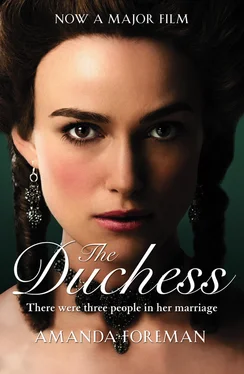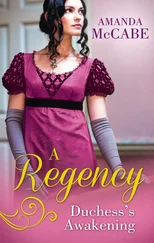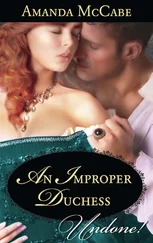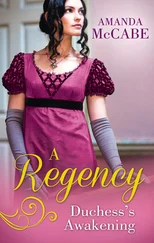Georgiana was confident that if she could reform her own life, protecting Harriet would be simple. Since her return from Coxheath she had sought to impress Fox and the other Whig leaders with her political understanding. She followed the debates in parliament, never missing an opportunity to discuss their implications at party dinners. Only a short time before people had described her as a novice: ‘I have also some hopes that she will turn Politician too,’ remarked a family friend in 1775, ‘for she gave me an account of some of the speeches in the House of Lords, Ld Grove made an odd one, and the Bishop of Peterborough a prodigious good one, only she said it was rather too much like Preaching.’ As an afterthought the friend added, ‘She must have heard all this from the Duke.’ 47 No doubt it was true then, but Georgiana soon became sufficiently well informed to have her own opinions about political debates. She had also perfected the skills required of a political hostess: her dinners at Devonshire House served a useful purpose: waverers could be kept in line and supporters rewarded. She had also learned how to extract information without betraying any secrets in return. She knew when to appear knowledgeable and when to appear ignorant.
Georgiana absorbed the minutiae of party politics. To an outsider the House of Commons was an inchoate system of temporary factions and alliances. In reality, the 558 MPs could be divided into three broad categories. The largest, with 185 or so members, was the ‘King’s Men’ or the court interest. These were MPs who received patronage from the crown and could therefore be relied upon to support any Prime Minister who had the confidence of the King. 48 The second group was made up of career politicians – some of whom, like Edmund Burke and James Hare, depended upon patrons – who regarded politics as an end in itself. The third and smallest category was the ‘Independents’, men who owed allegiance to no one and regarded themselves as above party politics. In fact they generally supported the government and only on very rare occasions voted with the opposition. In the House of Lords the court interest, known in the upper house as the ‘King’s Friends’, accounted for more than half the 150 peers, which made it impossible for the opposition Whigs to win any debate on numbers alone.
Among the career politicians there were, indeed, factions and alliances, named after the men who lead them – Shelburnite, Northite and Rockinghamite. The labels Whig and Tory, as applied to two distinct parties, only came into official use in the early nineteenth century. The idea of an organized opposition was not acceptable in the eighteenth century – any party which opposed the King was, in theory, committing treason. On the other hand, although opposition was regarded as the exception to good government rather than the rule, since 1688 the Commons had prided itself on its independence from the crown. Peers and MPs regarded it as their duty to be both servants to the crown and defenders of the constitution. In his Commentaries on the Laws of England Mr Justice Blackstone described the constitution as a framework of checks and balances: ‘In the legislature, the people are a check upon the nobility and the nobility a check upon the people; by the mutual privilege of rejecting what the other has resolved: while the King is a check upon both, which preserves the executive power from encroachment. And this very executive power is again checked, and kept within bounds by the two houses …’ 49
The Whigs had to be careful not to appear dangerous or disloyal. Edmund Burke spent much of his time defending the party against such charges by arguing that they were challenging the King in order to safeguard the victories of the Glorious Revolution. Even though the old Tory party was defunct, the Whigs used the name as a term of abuse against North’s ministry because of its reputation as the party of the King. Since the Whigs accused George III of increasing the influence of the crown at the expense of civil liberty, it suited them to call their opponents ‘Tories’. In fact the King was doing no such thing, and Lord North and the other men in government did not have the least shred of Tory sympathies, but the opposition Whigs liked to portray themselves as the true Whigs, martyred for their beliefs by the forces of tyranny.
Georgiana fervently believed this to be the case even if some members of the opposition were rather more cynical. When she wore the adopted Whig colours of blue and buff (taken from the colours of the American army) she did so out of conviction and expected her friends to do the same. It was precisely because she was a fervent believer that she was able to carry off her military uniforms and women’s auxiliary corps at Coxheath without being ridiculed. She had become one of the party’s best-known representatives. Fox was the first to recognize her talent for propaganda – they shared a flair for the public aspect of politics. They understood, for example, the potency of symbols in raising or lowering morale, in attracting or repelling support.
Fox encouraged Georgiana to play a greater role in increasing the party’s public presence. As a result, in January 1780 she failed to appear at court for the annual celebration of the Queen’s birthday. Society and the press remarked upon her absence. It was the first time she had shunned the court and people read it as a sign of the Whigs’ confidence that they would soon drive Lord North from office. When parliament reconvened on 8 February the government was beset by a number of crises. Not only was the war going badly; there was unrest in Ireland and a widespread fear that it might follow the example of America and declare independence. There was also popular discontent at home, fuelled by the Whigs, and hundreds of petitions poured in from around the country demanding democratic reform of the parliamentary system.
The session began promisingly enough. Prodded by the Whigs, the Duke of Devonshire at last gave his maiden speech in the Lords on 17 March. Edmund Burke congratulated Georgiana, saying with more hope than conviction, ‘it will become, by habit, more disagreeable to him to continue silent on an interesting occasion than hitherto it has been to him, to speak upon it.’ 50 Burke was leading the assault on North and the big push came in the shape of his Economical Reform Bill, which aimed to limit the crown’s powers by reducing the number of pensions and sincecures on the Civil List. The government defeated all but one of his proposals but at the expense of alienating backbenchers and independents by its heavy-handed methods of ensuring compliance.
On 6 April 1780 the Whigs ambushed North with a surprise resolution. John Dunning, a lawyer MP who had honed his rhetorical technique at the Inns of Court, rose to give a speech. His allegiance was well known and he began, as expected, by condemning the government’s quashing of the Economical Reform Bill. But then, with clear and precise logic he pointed out that over 100,000 people had petitioned parliament for change, and that the government’s response was merely to crush it. He paused theatrically, holding the House in rapt attention, before, his voice rising to a crescendo, he urged the following resolution: ‘The influence of the Crown has increased, is increasing, and ought to be diminished.’ The House was electrified; MPs jumped from their seats and waved their order papers at him. The vote was 233 to 215 in favour. Westminster was in pandemonium and the government thrown into confusion.
North’s immediate response was to tender his resignation, but George III insisted that he remain in office. The Speaker fell ill, preventing the Commons from meeting for a week, and Georgiana feared that the delay would cost them votes. ‘Lord Westmoreland [sic] as much as told me he should vote with North on Tuesday,’ she recorded. 51 When the Commons met again her presentiment proved correct. Dunning was overconfident and called for parliament to remain sitting until the changes demanded in the petitions had been implemented. This was too radical for the independent MPs, who voted against the resolution. The Whigs reacted bitterly: Dunning had thrown away their advantage. Fox approached him after the debate and advised him ‘to make no more motions’. 52 ‘We were sadly beat last night in the House of Commons,’ Georgiana informed Lady Spencer; ‘the ministry people are all in great spirits.’ 53
Читать дальше












